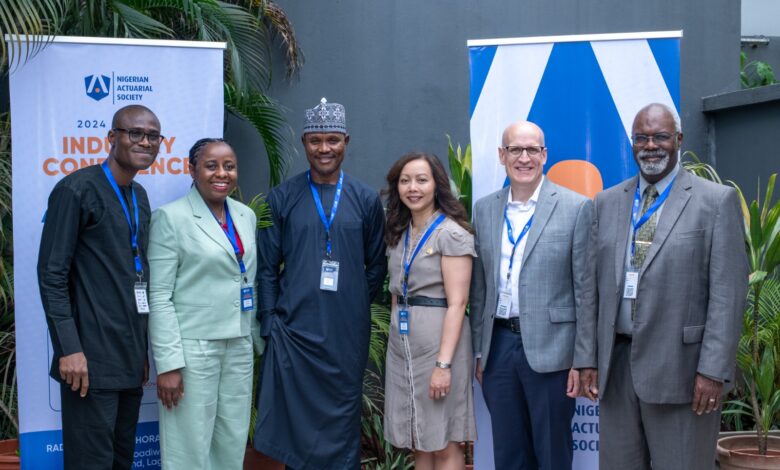NAICOM Boss Worried Over Inadequate Qualified Actuaries In Insurance Sector
By Sunday Etuka, Abuja

The Commissioner for Insurance/Chief Executive of the National Insurance Commission (NAICOM), Mr. Olusegun Omosehin, has expressed concerns over the current inadequate professionally qualified actuaries in the Nigerian insurance industry.
Actuaries are Professionals who compile and analyse statistics and use them to calculate insurance risks and premiums.
Speaking on Wednesday at the 2024 Nigerian Actuarial Society (NAS) Annual Industry Conference held in Lagos , Mr. Omosehin said, the Commission is seriously concerned over the development, and is committed to supporting all initiatives and developments that are likely to facilitate actuarial capacity development in Nigerian and/or enable the Nigerian insurance industry to access qualified actuaries.
He said, as the Nigerian insurance industry continues to evolve, the intersection of actuarial science and Artificial Intelligence (AI) presents a unique opportunity to further utilize the power of technology to shape the future of insurance in Nigeria.
Mr. Omosehin said, today, actuaries play a critical role in risk assessment, pricing, and financial stability using advanced techniques such as data science and predictive analytics to analyze complex data and make informed decisions,
He said, the profession has become increasingly important in the data-driven world, with actuaries in high demand across various economic sectors.
The NAICOM boss noted that the Federal Government of Nigeria plans to position Nigeria as the AI hub for AI solutions in Africa, through the development and implementation of a National Artificial Intelligence Strategy aimed at accelerating AI adoption in Nigeria.
“It is thus important that the insurance industry and, by extension, actuaries are at the forefront of its adoption”, he said.
In conformity with the above, Mr. Omosehin said, “the Commission is committed to the Federal Government strategy. We will ensure that our sectoral regulatory policies are consistent with the outlined goals of the Federal Government while enhancing the stability of the Nigerian Insurance Industry.
“Even though, there are perceptions that disruptive technologies like AI will replace every job and make a lot of skills obsolete. There may be credence to this sentiment, if like actuaries, we are to observe historical patterns.
“However, technological advances have always changed the landscape regarding jobs and relevant skill-sets. Like other technological disruptors, AI has the potential to transform the insurance industry and by extension the actuarial profession”, he said.
The Commissioner maintained that the pace at which AI is evolving means that actuaries have to also continuously evolve and develop skill sets that utilize AI and other machine learning tools or risk being left behind.
According to him, “the Nigerian Actuarial Society (NAS) has a vital role to play in equipping its members with access to the necessary skills to navigate the world of AI. This is why I am inclined to believe that this is one of the reasons we are having this conference”.
He said, “in the changing landscape, using AI for vast data analysis will be common place. This will enable actuaries delve deeper into large data; uncovering insights, and developing more accurate risk pricing models and innovative insurance products for the Nigerian populace”.
He said, “as an insurance industry regulator, we believe that this is the time to strengthen our collaborative efforts to ensure responsible AI adoption in order to maximize the strength and opportunities of Actuaries and AI”.
Mr. Omosehin enjoined the delegates at the conference to be expectant and open to ingenuities that would be offered by the presenters in the course of this conference as well as harness the true potential of AI in the Nigerian insurance industry.
While speaking on areas of collaboration, he said, there was a need for robust regulations to ensure the ethical use of AI in insurance, focusing on data privacy, fairness, and transparency.
He also said, there was a need to foster partnership between actuaries and AI developers where actuaries bring domain expertise, while AI developers provide the technical know-how. This, he said, would create solutions that are both effective and ethically sound.
According to him, the actuarial profession needs to embrace continuous learning to stay relevant in the AI age. Therefore, equipping actuaries with skills in data science, machine learning, and AI would be essential.
In conclusion, he said, the convergence of actuarial science and artificial intelligence holds immense potential for transforming the industry.
“By embracing the strengths and opportunities of AI while addressing its weaknesses and threats, we can navigate this new landscape with confidence and foresight”, he said.






